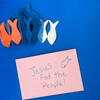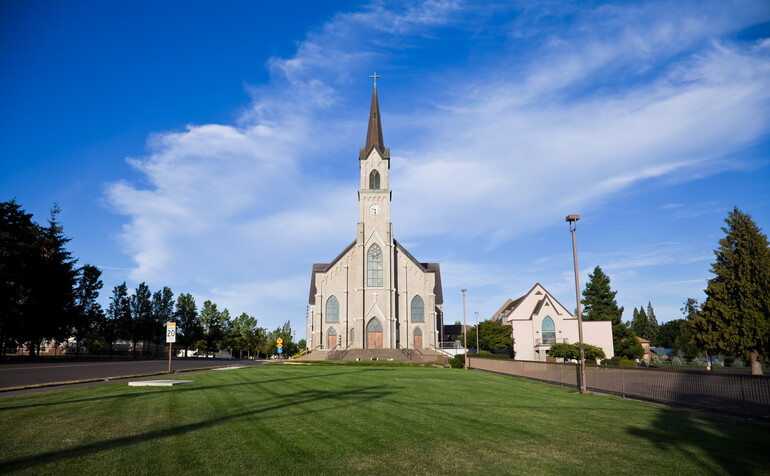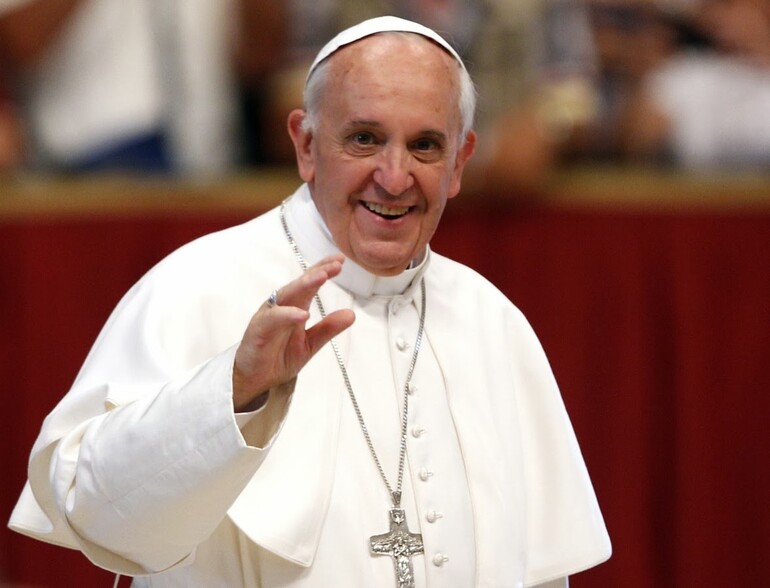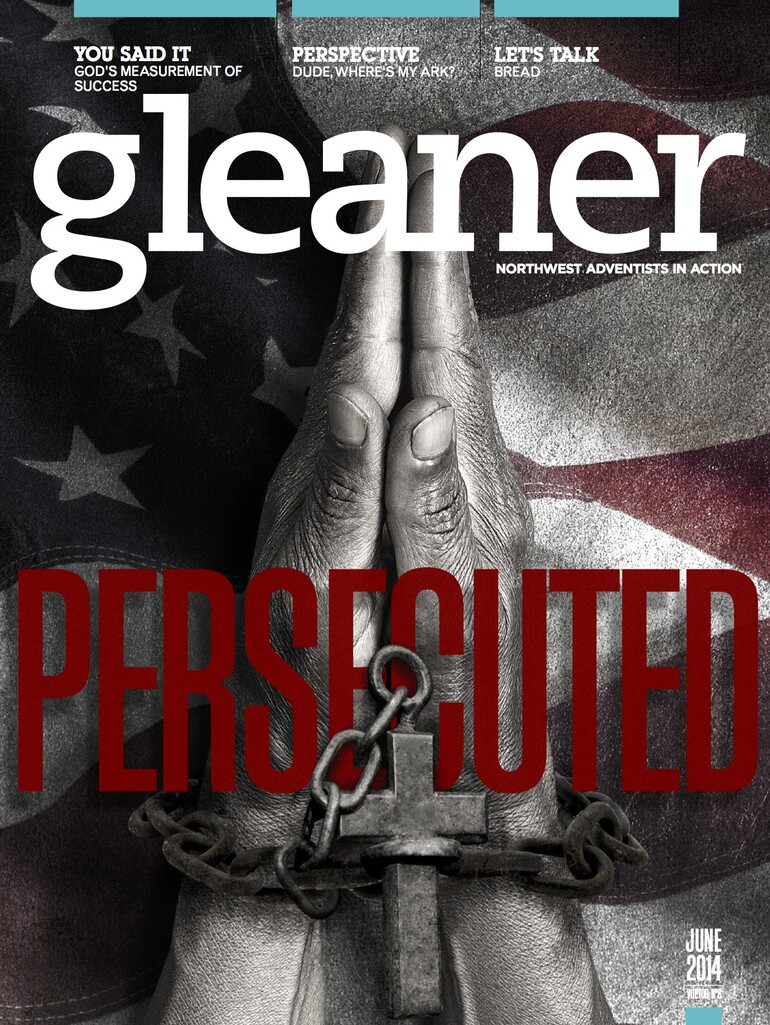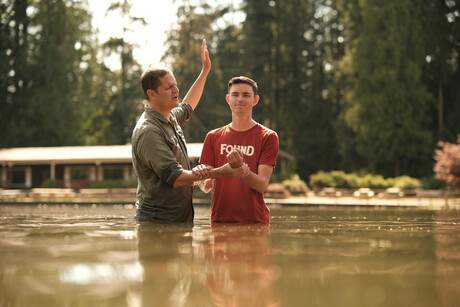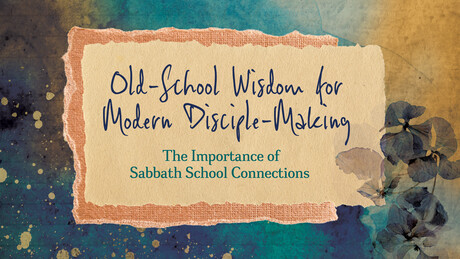The images are burned into history: Bible-based believers persecuted, even put to death for their faith. Centuries have buffered us somewhat from those scenes, yet the spector and potential of persecution is always present whenever human values collide.
It is indeed central to the concerns of many Christians across this country increasingly upset by a culture they perceive as intolerent of their faith. A variety of recent targets, from Christian television personalities to hometown bakers, have experienced public criticism and lawsuits because their personal philosophies run counter to politically correct views.
The Christian community has responded with outrage. Why is this traditionally "Christian nation" so opposed to Christians, they wonder. They feel persecuted by an expanding battle between secular and religious values.
Yet in the midst of this current philosophical struggle, many passionate believers, including a number of Seventh-day Adventists, will miss a truth that is counterintuitive to their perceptions. Religious persecution is often the product not of secular governments but of religious majorities seeking to protect and advance their position against perceived threats.
This is indeed a timely topic. Religious persecution is again on the world stage. It has reached a six-year high according to a report published by the Pew Research Center in January.1 Much of this persecution is centered in countries within the Middle East and Asia where Christians, as a significant minority, are targeted by violence and adverse legal systems. But it extends beyond these regions. According to the Pew study, “Incidents of abuse targeting religious minorities were reported in 47% of countries in 2012, up from 38% in 2011 and 24% in the baseline year of the study.”2
The Pew study also notes how religious majorities are influencing and directing governments against perceived threats from secularists and religious minorities. In Muslim-majority Egypt, for example, attacks on churches and Christian-owned businesses rose dramatically following the presidential election of Mohamed Morsi, an Islamist who has since lost power. Christians in Syria are being persecuted and driven from their homeland.3
In the aftermath of the Pussy Riot trials in Russia, the Russian Orthodox Church is putting pressure on its country’s parliament to legalize intolerance toward anyone who attempts to criticize the church. In Eastern Europe, the Orthodox Church is lobbying for laws that would mandate six-day work weeks and not certify other denominations, in an attempt to combat the threats of an aging and dying membership base, competing faiths and an increasingly secular youth culture.4
An Increasingly Popular Peacemaker
Pope Benedict XVI and now Francis I have led in the call to end the persecution. After only one year in office, Francis’s revival of Pope John Paul II’s emphasis on interfaith dialogue has Western leaders hopeful that Rome will be the world’s great diplomatic peacemaker. As predicted in Revelation 13:3 and 17:12, the world is poised to “wonder after” Rome as it uses its position as the only world power that is both church and state to present itself as the great champion of Christianity and world peace. No other church by virtue of its size, tradition, structure, charismas and energies is poised to play such a singular part in shaping the future of the religious and political world.
In a wildly surprising smartphone video message to charismatic Protestants at Kenneth Copeland’s mega church in Fort Worth, Texas, Francis said, “I am nostalgic, yearning, that this separation comes to an end and gives us communion.”
The pope’s unprecedented papal gesture was an invitation from personal friend and charismatic Episcopal bishop Tony Palmer, who introduced the pope’s remarks by proclaiming that “the protest is over! Luther’s protest is over! We are now all part of the universal church of Christ, the Catholic Church.” America’s Pentecostal leaders shouted “praise God, hallelujah!” and in a standing ovation waved arms high and swayed as if the Holy Spirit had taken over the conference.
Rome’s U.S. Influence
Shortly following, Pope Francis received a formal invitation from Speaker of the House John Boehner to address Congress. According to the U.S. House historian’s office, if the pope accepts, “it would be unprecedented” because “no pope or religious leader that serves as a head of state has ever addressed Congress.” Speaker Boehner said that “the pope’s address as a visiting head of state before a joint meeting of the House and Senate would … offer an excellent opportunity for the American people as well as the nations of the world to hear his message in full.”5
Pope Francis recently cautioned President Barack Obama about the Affordable Care Act’s contraception mandate and mentioned the Hobby Lobby case that was recently heard at the U.S. Supreme Court. In the United States, Catholics and evangelicals are uniting in support of business owners seeking exemptions from requirements to provide wedding-related services to gay couples. This year, religious leaders promoted legislation to amend state Religious Freedom Restoration Acts in 31 states in the name of strengthening religious freedom. But in nearly all of the bill proposals — especially those in Arizona and Idaho — the bills would have permitted violations of many anti-discrimination protections for the first time since Title VII of the Civil Rights Act became law in 1964. These laws — unless radically amended during the bill proposal stage — could have an adverse effect on Adventists because “religious” business owners could rely on them to deny Sabbath accommodations.
Efforts that appear to be motivated by the best of intentions are instead moving our country inexorably toward a repudiation of dearly held religious liberty safeguards.
Perceived Persecution and the Catholic Moment
Hence the problem with an upcoming Hollywood film, Persecuted. It’s a thriller that claims a political message about religious persecution, surveillance and the abuse of government power. The film, sponsored by a wealthy group of Catholics and evangelicals, is focused on a fictitious law, the “Faith and Fairness Act.” This supposed legislation requires competing faith claims to have equal airtime, where corrupt socialist government officials have aligned with leftist religious leaders against a charismatic Catholic televangelist, ironically named John Luther.6
The message of this film suggests that a nondemocratic, socialist, federal government exists, intent on persecuting conservative Christians. The plot feeds a brewing mindset that a revolution is required to stop this perceived persecution. Its vision is of a “time of trouble” very different than what Adventists have understood from a careful study of biblical prophecy.
The film ignores the important and historical position of neutrality for our secular government and instead affirms the “Christian Nation” mantra becoming increasingly popular among many evangelical churches. The revolution it espouses echoes the call of Jesuit priest Richard John Neuhaus in his book The Catholic Moment as the time in which “the Roman Catholic Church in the United States assumes its rightful leading role in the culture-forming task of constructing a religiously informed public philosophy for the American experiment in ordered liberty.”7 This is code for a constitutional revolution led by the Catholic Church in America, and with help from Rome and evangelicals.
The Adventist Difference
A constitutional revolution for this, however, would produce unintended negative consequences. Today’s growing alliance between Catholics and evangelicals who claim to be persecuted feeds into their biblical doomsday mindset in which a religious majority feels persecuted by secularist forces. Yet Adventists hold to their Protestant roots and believe the Bible portrays a very different future — just the opposite, in fact. According to Scripture, the religious majority will become militant in their quest for righteousness and power. They, not the secularists, will become the prophetic persecutors of those with whom they strongly disagree. The facts of persecution around the world even now are a grim testament to this unfortunate trend.
As Ellen White predicted, “They will force men to comply with their ideas of what is right. This is what the Jews did in the days of Christ and what the church has done ever since whenever she has lost the grace of Christ. Finding herself destitute of the power of love, she has reached out for the strong arm of the state to enforce her dogmas and execute her decrees. Here is the secret of all religious laws that have ever been enacted, and the secret of all persecution from the days of Abel to our own time" (Thoughts From the Mount of Blessing, p. 126).
Ellen White also wrote that “in order for the United States to form an image of the beast, the religious power must so control the civil government that the authority of the state will also be employed by the church to accomplish her own ends” (The Great Controversy, p. 443).
Note, she does not say secular-humanists, socialists or communists. No, the religious powers will manipulate and control the government for purposes which, on the surface, may appear to be good and righteous.
Adventists have often wondered how such a thing could ever happen globally — especially in America, the land of the free and home of the brave. These latest trends show unmistakably that we are closer than we realize to seeing this kind of religious power emerge in our country in the guise of victimization and spiritual revival (Revelation 13:13).
We should rejoice with the prospect of spiritual and ecumenical revival, but not at the expense of great principles of religious liberty so dear to our Constitution and our country. If there was ever a time for Adventists to be awake and vigilant, it is now.
Footnotes
- Pew Research Center, “Religious Hostilities Reach Six-Year High” (2014).
- Pew Research Center, “Religious Hostilities Reach Six-Year High,” 10.
- Ibid.
- Brian J. Grim, guest speaker, about his research at Pew Research Center titled “Religious Hostilities Reach Six-Year High" (presented at the Religion and Foreign Policy Conference Call, Council on Foreign Relations, April 2, 2014).
- Susan Davis, “Boehner invites Pope Francis to address Congress,” USA Today, March 13, 2014
- Napp Nazworth, “New Film ‘Persecuted’ Warns of Abuse of Gov’t Power, Religious Persecution,” The Christian Post, Feb. 13, 2014.
- Richard John Neuhaus, The Catholic Moment (New York: HarperCollins, 1987), 283.


